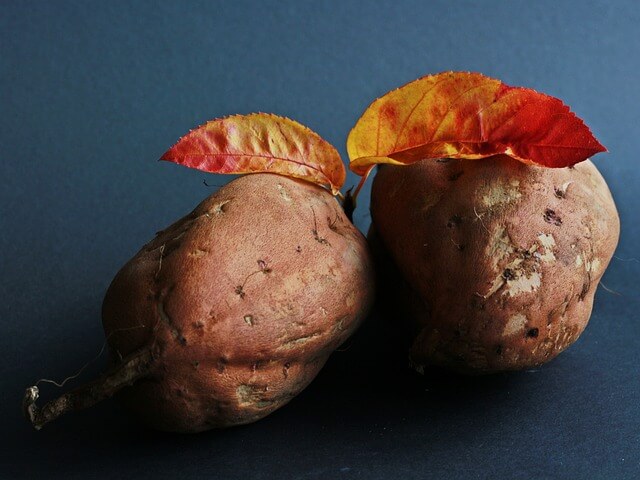On the surface, there’s nothing inherently wrong with feeding a dog with kidney disease moderate amounts of sweet potatoes.
These tasty tubers are actually a great source of vital nutrients, including:
- Dietary fiber: They are the leading source of dietary fiber among all vegetables. Fiber is critical in keeping your sick pup’s digestive system functioning smoothly.
- Loaded with antioxidants: Sweet potatoes are potent sources of antioxidants that help combat free radicals, which can cause cell damage in your dog’s body (including kidneys).
- Source of vitamins and minerals: The tubers are also excellent sources of vitamins and minerals, including vitamin C, potassium, manganese, and iron.
But Beware Of These Dangers
Apart from the above-highlighted beneficial nutrients, there are three valid reasons why you should limit (or eliminate entirely) the amount of sweet potatoes that you feed a dog with kidney disease.
1. High glycemic index
Glycemic index refers to a rating for carbohydrate-containing foods based on how quickly they can be converted into sugar in the body.
Foods with a high glycemic index tend to rapidly increase blood sugar levels after consumption.
Sweet potatoes are categorized as high glycemic load vegetables.
This means they have the potential to cause a rapid spike in your dog’s blood sugar levels.
This is not healthy for a dog with kidney disease because, over time, persistently high blood sugar levels exacerbate diabetes, which can cause a lot of damage to your pup’s kidneys.
2. High Potassium Levels
High potassium levels are a no-no for dogs with kidney disease.
When a dog has kidney disease, their kidneys struggle to properly remove excess potassium.
This can lead to an accumulation of too much potassium in the blood, which poses a danger to their overall health.
Sweet potatoes are potassium-rich vegetables, with a medium-sized baked piece of 156g estimated to contain up to 610mg of potassium.
While significant amounts of potassium can be removed through strategies like double-cooking or leaching, it’s important to note that these methods only reduce, but do not entirely eliminate the potassium content.
3. Canned Sweet Potatoes
Canned sweet potatoes are also not recommended for dogs with kidney disease due to added sodium, sweeteners, and artificial ingredients, all of which can worsen the progression of kidney disease in dogs.
Similarly, sweet potato casserole should be avoided because of added cream, butter, and sugar, which can be detrimental to your sick dog’s system.
The Bottom Line:
If you have a dog with kidney disease, it’s crucial to manage his potassium, phosphorus, and sodium intake.
To err on the side of caution, it’s best to limit or avoid high-potassium and high-glycemic vegetables like sweet potatoes.
Most importantly, always consult with your veterinarian before introducing sweet potatoes to your sick pup’s diet.
What may be safe for one dog could be risky for another, depending on various factors, including age, health history, or the stage of the kidney condition.
Speaking of consulting a vet, did you know you don’t always have to take your dog to the vet?
There are dedicated professionals who can provide a full range of treatments right at your doorstep — from wellness check-ups to diagnostics and sick care.
The Vets can make this convenience a reality. Click here to find a mobile vet in your area.
Also Read:
Is Pumpkin Good for Dogs with Kidney Disease?
How to Cook Sweet Potato for Dogs
As an Amazon Associate, we may receive a small commission from qualifying purchases but at no extra cost to you. Learn more. Amazon and the Amazon logo are trademarks of Amazon.com, Inc, or its affiliates.

